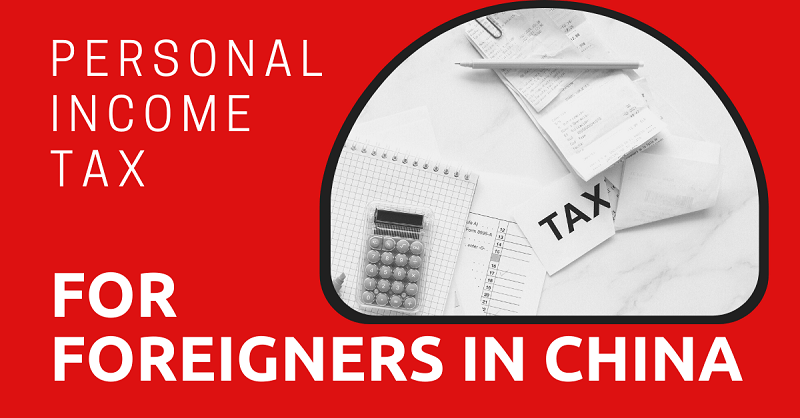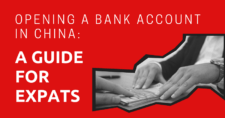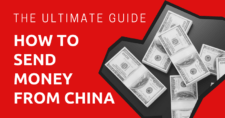
If you’re making money in China, as an employee or as a business owner, then you are rightly expected to contribute to the society you’re benefiting from. But don’t worry, taxation in China is lower than in many countries, and paying it is easy for most expats.
In this article we’ll explain who needs to pay tax and on what income, what exemptions are available, and what the current rates are.
This article will take approximately 10 minutes to read. Don't have the time right now? No worries. You can email the ad-free version of the article to yourself and read it later!
Disclaimer: This article may include links to products or services offered by ExpatDen’s partners, which give us commissions when you click on them. Although this may influence how they appear in the text, we only recommend solutions that we would use in your situation. Read more in our Advertising Disclosure.
Contents
What Income is Taxable in China?
Essentially any income earned in China is subject to taxation in China. The Chinese tax authorities specify nine different kinds of income for tax purposes:
- Income from salary and wages: This includes wages, salaries, bonuses, year end salary bonuses, labor dividends, allowances, subsidies and other income from or related to your employment.
- Income from remuneration for personal services: Any payments you might receive for services such as design and decoration, installing or supporting software, medical treatments, legal advice, accounting, consultancy, lecturing, translation, proofreading, artworks, acting or voiceover work, music, or tutoring.
- Income from author’s remuneration: Journalism, whether in print or online, and royalties from books are included in this category.
- Income from royalties: Separate from book royalties, this refers to payments for patent rights, trademark rights, copyrights, rights to use non-patented technologies, and other proprietary rights. Income from providing copyright rights does not include income from author’s remuneration.
- Income from business operations: Subdivided, as follows: Income from industrial and commercial activity; Income from running schools or businesses providing medical treatment, consulting or other paid medical services; Income from subcontracting and subletting; Income obtained by individuals from engaging in other production and business activities.
- Income from interest, dividends or bonuses: Largely self-explanatory, this category includes interest on loans.
- Income from the lease of property: “Property” here means not only real estate, but also machinery and equipment, motor vehicles, and even boats.
- Income from the conveyance of property: Income from sales of securities, equities, shares is included here, as well as of property.
- Contingent income: This catchall category covers “awards, prizes and other windfalls.” Be aware that if you win the lottery in China, it’s not tax free!
Income Earned Outside of China
Whether you are required to pay tax on income from outside China depends on whether you are considered to be resident or non-resident. Non-residents have to pay tax on income earned in China, but not on their global income.
Residence is defined as having lived in China for six consecutive years or more, and having spent an average of 183 days (i.e., more than half the year) in China during that year. It doesn’t matter whether these 183 days are continuous or interrupted, it’s the total number of days during the year that counts.
If you are deemed to be resident, you’re liable for tax on all your income anywhere in the world for any tax year where you’ve spent 183 days or more of that year in China, wherever that income was earned.
It’s also important to understand the difference between “resident” and “domiciled”. Your domicile is your long-term home, usually (but not always) your country of nationality. If you have been granted permanent residence in China, you are likely to be considered domiciled in China.
Anyone domiciled in China is liable to taxation on all their income from anywhere in the world. This applies even if you are also required to pay tax in the territory where the money was earned.
However you may be required to pay tax on your global income even if you are not domiciled in China but are considered to be “resident”.
What Are the Income Tax Rates?
Income taxes in China are progressive, meaning that higher percentages are applied to higher income bands. So, the first RMB 36,000 is taxed at 3 percent, the next RMB 108,000 at 10 percent, and so on.
Tax rates are of course subject to change, but these are offered as a general guide, particularly for those who are assessing whether to make the move to China, and want to estimate how much of their salary will be taken as tax.
Annual Rates
Multiply your income by the appropriate percentage, and subtract the “quick deduction.”
The quick deduction represents the portion of your income which is taxed at lower rates, and saves you dividing up your income into bands and calculating each separately.
| Annual taxable income (RMB) | Percentage | Quick deduction (RMB) |
| 0 to 36,000 | 3 | 0 |
| Over 36,000 to 144,000 | 10 | 2,520 |
| Over 144,000 to 300,000 | 20 | 16,920 |
| Over 300,000 to 420,000 | 25 | 31,920 |
| Over 420,000 to 660,000 | 30 | 52,920 |
| Over 660,000 to 960,000 | 35 | 85,920 |
| Over 960,000 | 45 | 181,920 |
Monthly Rates
Calculate your approximate monthly tax liability
| Annual taxable income (RMB) | Percentage | Quick deduction (RMB) |
| 0 to 3,000 | 3 | 0 |
| Over 3,000 to 12,000 | 10 | 210 |
| Over 12,000 to 25,000 | 20 | 1,410 |
| Over 25,000 to 35,000 | 25 | 2,660 |
| Over 35,000 to 55,000 | 30 | 4,410 |
| Over 55,000 to 80,000 | 35 | 7,160 |
| Over 80,000 | 45 | 15,160 |
Business Income Tax rates
This applies to income earned from privately-owned businesses, sole trader enterprises, or partnerships.
| Annual taxable income (RMB) | Percentage |
| 0 to 30,000 | 5 |
| Over 30,000 to 90,000 | 10 |
| Over 90,000 to 300,000 | 20 |
| Over 300,000 to 500,000 | 30 |
| Over 500,000 | 35 |
All other income is charged at a flat rate of 20 percent. There are no local income taxes in China.
What Exemptions Apply to Foreigners?
If you have been in China for fewer than 90 days and you are employed by a foreign organization you are exempt from paying taxes; any income earned in China that isn’t paid by your employer’s Chinese branch is not taxable in China (though may be in your home country).
There are also exemptions to certain types of income for citizens of other countries. (These also apply to those holding passports issued in Hong Kong, Macau or Taiwan). These exemptions are classed as temporary, and renewed on a rolling two-year basis.
Each renewal is preceded by rumors that the exemptions are going to be scrapped, but they were renewed at the last minute in 2021 so apply at least until December 31 2023.
Allowances & Subsidies
The following are not subject to income tax:
- Housing subsidies, food allowances, moving fees and laundry fees, provided these are paid as vouchers or credits, or as reimbursement for actual expenditure.
- Relocation expenses. These need to be “actual reimbursement for actual costs” in connection with taking up or leaving employment in China, and your employer can’t simply give you monthly or regular payments and label them as “relocation expenses” for tax purposes.
- Allowances for business travel, in China and worldwide. However these need to be “at a reasonable standard.”
- The reasonable costs of visiting family, which is defined as the cost of travel between the individual’s place of employment in China, and their “home location” (which can include the residence of their spouse or parents), not more than twice a year.
- Language training fees and children’s education fees incurred in China which are deemed to be reasonable.
Lump Sums Paid by Foreign Employers
If your employer pays you a single lump sum to cover salary, expenses, and living allowance (housing and travel), then as long as the payment can be clearly divided between those costs, you are only liable for income tax on the salary portion of the payment.
Tax Benefits for Dividends
If you own any shares in a Foreign-Invested Enterprise (FIE), any dividends or bonuses paid out are tax exempt. An FIE is defined as a business registered and operating in China which is wholly or partly invested by foreigners, and includes:
- Wholly foreign-owned enterprises (WFOEs)
- Sino-foreign equity joint ventures (EJVs)
- Sino-foreign cooperative joint ventures (CJVs)
- Foreign-invested companies limited by shares (FICLSs)
- Foreign-invested investment companies (FIICs)
- Foreign-invested partnerships (FIPs)
- Foreign-invested venture capital enterprises (FIVCEs).
Foreign Experts’ Wages & Salaries
“Foreign experts” is a specific category of people under Chinese law, so no matter how great your expertise in your profession, this doesn’t apply to you unless the government says so! Recognized experts generally fall into one of the following groups:
- Foreign citizens sent by the World Bank to work in China in accordance with a special loan agreement;
- Experts directly sent by the United Nations’ Organizations to work in China;
- Experts coming to work in China for United Nations aid projects;
- Experts sent by an aid-granting country to China to work specially on a relevant project;
- Cultural and educational experts coming to China to work for up to two years on a cultural exchange project under an agreement signed between governments;
- Cultural and educational experts coming to China to work for up to two years on international exchange projects with Chinese universities and colleges;
- Foreign citizens coming to work in China under a non-government scientific research agreement.
Tax Exemptions for Income from Stock Transfer
This is complicated, but relates to the Shanghai-Hong Kong Stock Connect program, which allows international traders to trade certain Shanghai-listed shares on the Hong Kong Stock Exchange, and vice versa. Profits from these trades are currently tax-free.
Applying for a Tax Residence Certificate
Tax certificates act as proof that you are resident in China for tax purposes. You might need one because you’re applying for a residence permit, or to prove to the tax authorities back home that you are not liable for taxation there.
Applications should be submitted to your local tax bureau. You’ll need the following documents:
- A completed application form
- The original and a copy of your current passport
- A copy of your employer’s tax registration certificate
- The original receipts for your individual income tax and other tax payments (if you don’t have these, submit a written letter of explanation letter)
- Any supporting documents demonstrating your residence in China
- Any other supporting documents required by the tax authority bureau.
Now, on to You
Nobody likes paying taxes, but we like the consequences of not paying taxes even less! It’s important to get this right, so please note that, although we can offer a general guide, if you have a question or concern about your personal tax situation, it’s important that you seek professional advice, either from the tax authorities or a properly qualified lawyer or accountant.
The information in this article was correct at the time of writing, but you should be aware that the exemptions for foreigners will be reviewed at the end of 2023, and other regulations can change at any time.
If you’re working as an employee, rather than running a business, then your employer will take care of most of this for you, and you only need to declare any other income (including income in other countries for those classed as domiciled or resident for 6 years or more). However, paying tax remains your legal responsibility.
Overall, for most people considering a move to China, tax should not be a disincentive. The burden is not excessive, and the rules are relatively clear and simple (which is more than can be said for many official processes). In the highly developed infrastructure in major cities, you can at least see where your tax yuan is going!






